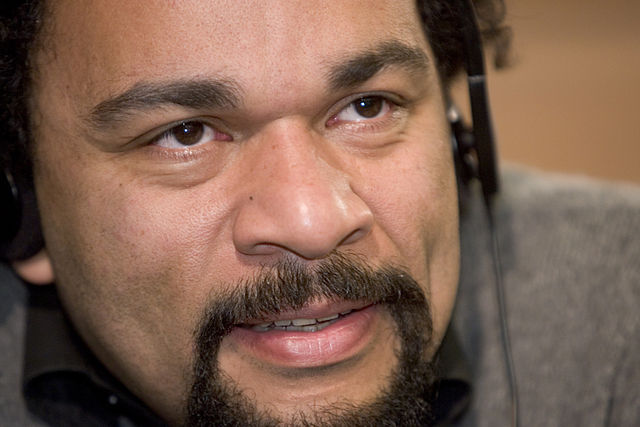
On Wednesday, French comic Dieudonné was sentenced to two months in a Belgian prison for comments made during a show in Liège in 2012 (he has a right to appeal).
According to the Daily Telegraph, during the show, Dieudonné praised Hitler, questioned the existence of the death camp gas chambers, and referred to the Talmud as a “shit book”.
It doesn’t sound like the most fun night out, does it?
Have you ever spent time around neo-Nazis? It’s exhausting, draining and baffling. I recall once, outside a courtroom, hearing a leading Holocaust revisionist explaining to a young west African man how “the Zionists” were plotting to pit black and white people against each other. He was simultaneously sinister and baffling.
In its way, it’s fascinating that these odd obsessive people exist. The novelist Howard Jacobson once said he took joy in the particular classical punishment that was doled out to anti-Semites: they spend days and days studying Jewish texts - more than many rabbis - making them angrier and angrier and odder and odder: in their bid to exterminate Jewishness they are trapped by it.
This is possibly true, but that irony will be of scant consolation to the victims of Amedy Coulibaly, murdered in a Paris kosher supermarket in January, during an attack synchronised with that on the offices of Charlie Hebdo. “As far as I'm concerned I feel like Charlie Coulibaly”, Dieudonné posted online, on the days when world leaders gathered in Paris to wave their Je Suis Charlie banners and not talk about jailed journalists and whistleblowers (take note, Dieudonné’s defenders: I have managed to point out political hypocrisy without declaring myself empathetic with a Jew-hating killer).
That post earned Dieudonné an arrest for glorifying terrorism. Twelve months previously, Dieudonné was in the news as his “quenelle” gesture - an “inverted Nazi salute” spread on social media and onto the football pitch via Nicolas Anelka. Dieudonné was banned from the UK, an event which I’m sure did not unduly worry the bookings manager at the Hammersmith Apollo.
The list of indictments goes on: shows with Holocaust revisionist Robert Faurisson; repetition of that modern blood libel - the organ-stealing Israelis - the full monty of Jew hatred.
And yet the shows go on. Unsurprisingly, convictions have done no harm to Dieudonné’s “anti-establishment” status: indeed, they have gone some way to reinforcing another hit idea among anti-Semites, that “the Jews” can manipulate the state and establishment in their favour at whim. This perception is likely to have been enhanced by a European ruling against Dieudonné earlier this year that found that the right to “free speech” does not extend to anti-Semitism.
Even if restrictions on Dieudonné’s free speech were not counterproductive, they would still be undesirable. In the wake of the latest Paris atrocity, much was made of the fact that it was an attack on a certain way of life, a certain way we, as Europeans, like to identify: urbane, cosmopolitan, eating, drinking, dancing, talking and thinking (“They have guns, we have champagne”, Charlie Hebdo announced). But if that is what we aspire to, then we can’t ditch the freedom to write, to read, to speak and to hear, and we certainly can’t limit it to people we imagine we’d enjoy sharing a bottle with en terrasse. That’s just not how liberty works.
With Brussels only just back in action, and Paris still reeling, it may not seem quite the right time to start lecturing on liberalism: but if we’re serious about the values we profess to love, then now’s the exact time to stand up for them: we should concentrate on defeating Dieudonné and his fellow travellers in debate, not in the criminal courts.